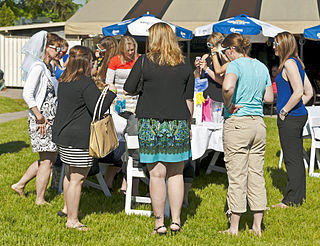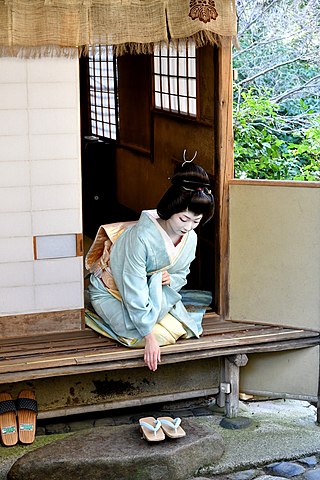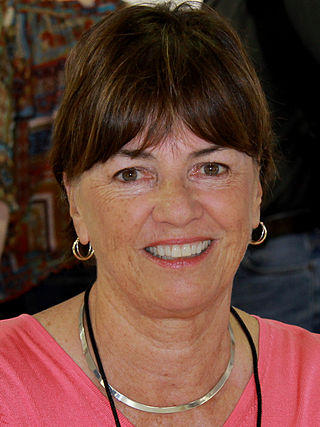
Etiquette is the set of norms of personal behaviour in polite society, usually occurring in the form of an ethical code of the expected and accepted social behaviours that accord with the conventions and norms observed and practised by a society, a social class, or a social group. In modern English usage, the French word étiquette dates from the year 1750.

Politeness is the practical application of good manners or etiquette so as not to offend others and to put them at ease. It is a culturally defined phenomenon, and therefore what is considered polite in one culture can sometimes be quite rude or simply eccentric in another cultural context.

Judith Martin, better known by the pen name Miss Manners, is an American columnist, author, and etiquette authority.
Book of the Civilized Man, by Daniel of Beccles, is believed to be the first English courtesy book, dating probably from the beginning of the 13th century. The book is significant because in the later Middle Ages dozens of such courtesy books were produced. Because this appears to be the first in English history, it represented a new awakening to etiquette and decorum in English court society, which occurred in the 13th century. As a general rule, a book of etiquette is a mark of a dynamic rather than a stable society, one in which there is an influx of "new" men, who have not been indoctrinated with the correct decorum from an early age and who are avid to catch up in a hurry.

A bachelorette party or hen night is a party held for a woman who will soon be married. While Beth Montemurro concludes that the bachelorette party is modelled after the centuries-old stag night in the US, which is itself historically a dinner given by the bridegroom to his friends shortly before his wedding, Sheila Young argues that its British counterpart evolved from a number of earlier pre-wedding traditions for women whose origins are obscure but which have been around for at least a century in factories and offices across the UK. Despite its reputation as "a sodden farewell to maiden days" or "an evening of debauchery", these events can simply be parties given in honor of the bride-to-be, in the style that is common to that social circle.

Etiquette in Japan forms common societal expectations of social behavior practiced throughout the nation of Japan. The etiquette of Japan has changed greatly over the millennia as different civilizations influenced its culture. Modern Japanese etiquette has a strong influence from that of China and the Western world, but retains many of its unique traditional elements.

Table manners are the rules of etiquette used while eating, which may also include the use of utensils. Different cultures observe different rules for table manners. Each family or group sets its own standards for how strictly these rules are to be followed.
Taarof or Tarof is a Persian word which refers to an Iranian form of civility or art of etiquette that emphasizes both deference and social rank.

Etiquette in Asia varies from country to country even though certain actions may seem to be common. No article on the rules of etiquette, nor any list of faux pas, can ever be complete. As the perception of behaviors and actions vary, intercultural competence is essential. A lack of knowledge about the customs and expectations of Asian people can make even those with good intentions seem rude, foolish, and disrespectful.
Expectations regarding good manners differ from person to person and vary according to each situation. As the perception of behaviors and actions vary, intercultural competence is essential. However, a lack of knowledge about the customs and expectations of people in Australia and New Zealand can make even the best intentioned person seem ignorant, inconsiderate or even rude. Given the historic roots, it's very similar to British culture, specifically the United Kingdom, terms such as ‘fanny’ as well as the emphasis on politeness in queuing are observed in both cultures.
Etiquette rules in the United States and Canada generally apply to all individuals, unlike cultures with more formal class structures, such as those with nobility and royalty.

Peggy Post is an American author and consultant on etiquette. She is Emily Post's great-granddaughter-in-law and continues her work as director and spokesperson for The Emily Post Institute in Vermont.
Etiquette in technology, colloquially referred to as netiquette, is a term used to refer to the unofficial code of policies that encourage good behavior on the Internet which is used to regulate respect and polite behavior on social media platforms, online chatting sites, web forums, and other online engagement websites. The rules of etiquette that apply when communicating over the Internet are different from these applied when communicating in person or by audio or photographic phone. It is a social code that is used in all places where one can interact with other human beings via the Internet, including text messaging, email, online games, Internet forums, chat rooms, and many more. Although social etiquette in real life is ingrained into our social life, netiquette is a fairly recent concept.
Florence Hartley was a Victorian-era writer whose work was meant for women of the era, covering topics of etiquette and needlework. She was also an advocate for women's health.

Table manners are the cultural customs and rules of etiquette used while dining. As in other areas of North American etiquette, the rules governing appropriate table manners have changed over time and may differ depending on the setting.

Japanese dining etiquette is a set of traditional perceptions governing specific expectations which outlines general standards of how one should behave and respond in various dining situations.
Cannabis etiquette is the set of conventional rules of behavior when consuming cannabis.

Higher Etiquette: A Guide to the World of Cannabis, From Dispensaries to Dinner Parties is a book about cannabis etiquette by Lizzie Post.
Daniel Post Senning is an American etiquette expert. He is the co-president of the Emily Post Institute, founded by his great-great-grandmother Emily Post.

Lillian Eichler Watson was an American advertising copywriter and author of bestselling books of etiquette. Her first Book of Etiquette, published in 1921 and for which she created the advertising campaign Again She Orders..."A Chicken Salad, Please", was an immediate bestseller and was followed by several updated volumes and numerous other books.











